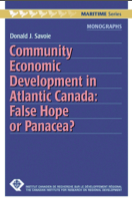The monograph explores some of the factors that have made CED successful in some parts of the region and how government was able to contribute to that success. The report provides a brief literature review and proceeds to examine four communities in Atlantic Canada: Summerside in Prince Edward Island, Kent County in New Brunswick, Isle Madame in Nova Scotia and Bishop’s Falls in Newfoundland.
Concluding that CED is a process rather than an end in itself, Mr. Savoie defines CED as a forum in which interested parties join together in a partnership arrangement to create new jobs and promote economic activity in a well-defined area. The factors of success are somewhat different in the four areas studied. In Summerside, Savoie believes that success was due to the top-down involvement of the three levels of government. In Isle Madame, he attributes the success to a bottom-up approach; while in Bishop’s Falls, it could be considered to be the partnership that was forged between community groups and government. In Kent County, the author implies that the region’s entrepreneurial spirit was one of the main driving forces of economic change.
He also concludes that the smaller and more homogeneous the geographical area, the more successful it will likely be in handling an economic crisis. Mr. Savoie believes that governments should not make communities dependent on continuing financial support, but that they should provide communities with some financial assistance at the outset to develop new community institutions, to generate new ideas and to launch new economic activities.
Mr. Savoie suggests that one way federal and provincial governments could ensure accountability while still allowing enough flexibility for communities to grow economically would be to enter into multi-year agreements with designated communities to provide financial resources on a sliding scale. Mr. Savoie also recommends that the Atlantic region develop a capacity to support the employees and volunteers working in the field of community economic development.





